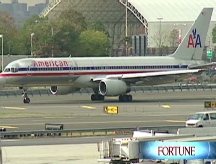Air travel hassles cost the economy $26B - survey
Travel Industry Association says headaches at the airport caused 41 million trips to be avoided over the last 12 months.
NEW YORK (CNNMoney.com) -- The dysfunctional air travel system is causing many Americans to avoid air travel and the economy is suffering as a result, according to a survey released Friday.
The survey, conducted by the Travel Industry Association (TIA), a non-profit trade organization, found that frustrated travelers avoided roughly 41 million trips over the last 12 months, which cost the economy more than $26 billion.
"Many travelers believe their time is not respected and it is leading them to avoid a significant number of trips," said Allan Rivlin, a partner at Peter D. Hart Research Associates, which interviewed 1,003 air travelers for the survey.
The avoided trips are having an impact on the broader economy. Over the last 12 months, there was $9.4 billion in revenue lost by airlines, $5.6 billion lost by hotels, $3.1 billion lost by restaurants and $4.2 billion lost in federal, state and local taxes, according to TIA.
"The air travel crisis has hit a tipping point, " said Roger Dow, president and CEO of TIA. "More than 100,000 travelers each day are voting with their wallets by choosing to avoid trips."
A majority of travelers said air travel safety and security has improved. But inefficient security screening, flight cancellations and delays were the top frustration among air travelers surveyed.
Overall, more than 60% of respondents think the air travel system is deteriorating. But travelers are most irritated with the air travel process, not the airlines.
TIA says the federal government can address some of travelers' top frustrations, including delays, cancellations and inefficient security screening.
"With rising fuel prices already weighing heavily on American pocketbooks, we need to find ways to encourage Americans to continue their business and leisure travel." Dow said.
To that end, TIA announced plans to hold an "emergency summit" of travel leaders in Washington on June 17, and called on each of the presidential candidates to address the issue.
The debate over how to improve the system, which has traditionally been dominated by the government and the aviation industry, is "stale and stagnant," said Geoff Freeman, a TIA senior vice president.
Freeman said the the air travel system has problems "that the government and aviation industry cannot fix, " and that the industry is suffering from a "failure of leadership."
In a statement responding to the survey, D.J. Gribbin, general counsel of the U.S. Department of Transportation, said the Bush administration has undertaken a number of steps to help ease air service problems, including congestion-relief initiatives in the New York area and increased compensation for passengers who get bumped from flights.
"The Transportation Industry Association survey helps quantify the frustrations facing today's air travelers, who bear a high cost in terms of delays and congestion," Gribbin said. ![]()




